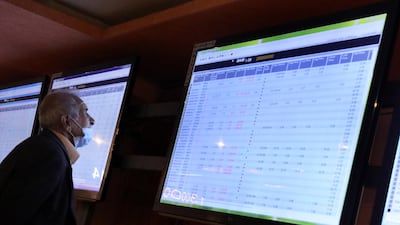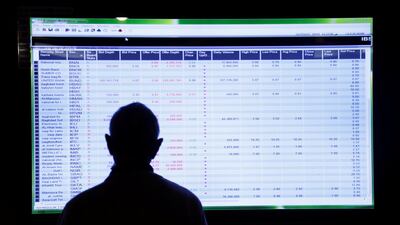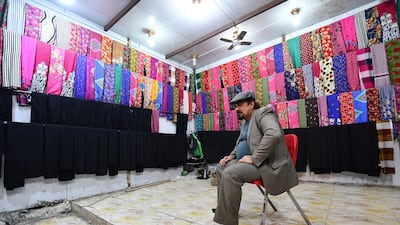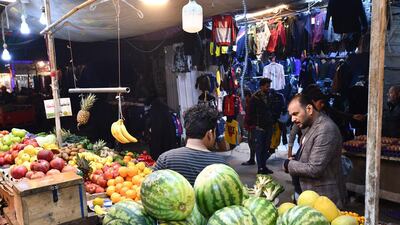News of Iraq’s currency devaluation spread quickly last week when a copy of next year’s draft budget was leaked to local media. The news sent the unofficial rate at exchange houses skyrocketing, disturbing local businesses and panicking Iraqis.
"We are finished," Tayieb Sabah, 40, told The National on Sunday as he walked nervously through the aisles of his supermarket, instructing workers to take down goods from the shelves and adjust prices upwards.
"We have been accumulating losses since last week due to the fluctuation in the exchange rate after the devaluation news spread. We pay the suppliers in dollars and sell in dinars," Mr Sabah said.
Before the news, the unofficial exchange rate ranged from 1,200 to 1,240 dinars against the dollar. That rate soon hit as much as 1,400.
“Suppliers have been calling us all day to change prices and we don’t know what to do,” he said.
As a salesman entered the supermarket to offer goods, Mr Sabah yelled at him.
“No, thanks. I will not order anything today.”
“Sir, we sell according to the old prices,” the salesman told the supermarket owner, who turned his face away.
“Let’s wait and see to where this chaos will take us,” Mr Sabah said. “I want to save myself and my business first.”
Iraqi Prime Minister Mustafa Al Kadhimi said he would be the “first hurt” by the devaluation, because of the inevitable public backlash.
But Iraq is also draining its currency reserves and faces a record-breaking $40 billion deficit next year, according to Finance Minister Ali Allawi. At the same time, the draft budget has reined in earlier government proposals to cut public sector salaries, which comprise nearly 80 per cent of government spending.
Those salaries are now increasingly in jeopardy as Iraq's funds diminish.
As a result, Iraq’s policymakers are grappling with what promises to be the most controversial budget since 2005, when Iraq drafted its first budget after the 2003 fall of Saddam Hussein.
Economic nosedive
Mr Sabah is now applying a 25 per cent increase on the total amount of each invoice, something grudgingly accepted by clients.
“The grave consequences of this move will not appear now. But we’ll see them two to three months from now when the market enters into recession,” he said.
On Sunday, wholesale and retail markets in Baghdad and other cities were almost deserted as sellers applied the higher exchange rate as protection, while buyers preferred to wait until things calm down.
“I will wait and see how things go. There are rumours that the government might retreat and apply the previous exchange rate,” said one currency exchanger.
Some exchange houses prefer to keep working but are playing it safe.
“Since the price is unstable, I buy the dollar at the 1,400-dinar rate and sell at 1,460,” Emad Salman, 63, said.
Demand for dollars has increased by nearly 50 per cent since last week, Mr Salman said.
Surging poverty
“All prices have increased by at least 20 per cent,” said Balkis Abbas, while shopping at one of Baghdad’s markets. Mrs Abbas is a doctor employed by the Defence Ministry and before the recent crisis, could have counted herself lucky to have a coveted government job.
Like many Iraqis, the mother of two says her family has been reduced to buying essentials, and the list of what they can afford is steadily shrinking.

Among things omitted from her shopping list are preparations for Christmas, cancelling perfumes and household goods she had ordered previously.
“To be honest, I will not take a risk and pay for these unessential things now because the situation is unstable,” she said, loading her car with a few bags of essential winter clothing for her daughters.
“Now, whoever has children pays only for food and drinks,” she said.
If the planned 50 per cent deduction on allowances is applied – a cut suggested by the government but not yet implemented– she will end up with about 1.5 million Iraqi dinars a month, about half of which goes to pay rent. “I will quit my job and leave to the country,” she said.
An uncertain year ahead
The devaluation has severely hit the pockets of public servants, raising fears that a burgeoning youth protest movement, until now largely confined to the unemployed, will expand to the public sector.
Such a development is becoming more likely. According to Mr Allawi, without urgent austerity measures Iraq’s foreign currency reserves could be depleted in as little as six months. In other words, currency devaluation is a necessary but bitter medicine. But it will not be enough.

"The devaluation was done in full co-operation with all the major political parties and Ali Allawi explained the reasons behind this and they all agreed," Sarkwat Shams, a Kurdish MP for the Future Party, told The National.
"There may be some noise on the streets and some members of parliament may make some noise, but when the budget bill will come to parliament they may increase or decrease some of the cuts proposed by government. But it will pass, there is no other way to help the government to fund itself."
Other Iraqi political leaders disagree.
Ayad Allawi, former prime minister and secretary general of the Iraqi National Movement said that he warned the government five years ago about the situation.
Mr Allawi called for the formation of an international body to oversee the dollar auctions held by the Central Bank, long suspected of being a major source of corruption involving shell companies.
"The decision to lower the prices of the dinar is wrong, and shows the government's inability to deal with the economic crisis, especially because it seriously hurts Iraqi families," he said.
Security salaries on the line
Many MPs in parliament said they would oppose salary cuts, calling them a “red line”.
In addition to re-energising Iraq’s protest movement, Iraq’s sharp economic decline could give rise to the worrying spectre of security turbulence next year, if the situation is not reversed.
Iraqi authorities recently stationed anti-riot troops around the Central Bank in Baghdad after new demonstrations began on Monday afternoon.
Much worse could lie ahead. At the height of the war against ISIS, a public row erupted between members of Iraq’s Popular Mobilisation Forces, a group of militias who are mainly loyal to Iran.
At issue was the question of fighters’ salaries and whether the cash-strapped Iraqi government could raise them as oil prices tumbled below $30, or expand the number of fighters on the payroll.
Some groups, including a powerful militia controlled by the unpredictable cleric Moqtada Al Sadr, accused Iran-backed groups of stealing funds.
But now the situation is much worse, with little sign of recovering oil prices, at least not to the level the Iraqi government requires to pay salaries. The risk now is that groups in the PMF, which have clashed in the past, could again come into conflict.
According to Sajad Jiyad, an Iraqi analyst and fellow at The Century Foundation, this will not be a concern as long as funds are available.
"The devaluation will not have an impact on salaries being delayed for security forces, because the government has prioritised payment of salaries for security forces for many years, even during a crisis,” he said.
But that could change next year, especially if Finance Minister Allawi’s warning about available currency reserves rapidly diminishing holds true.
“Going forward, if there was a salary reduction and taxes, that’s when it will begin to hurt people, especially in the security sector."
Iraqi policymakers now face an impossible dilemma, risking the creation of a new, nationwide protest movement next year, whether austerity measures are implemented or not.











